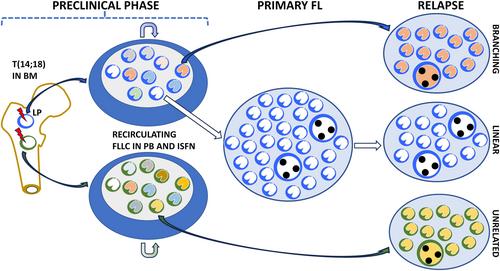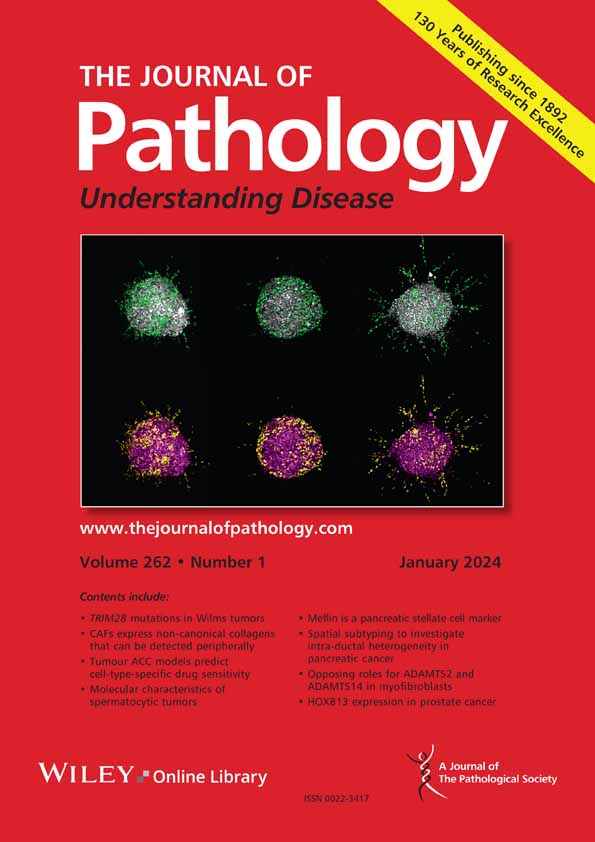下载PDF
{"title":"Clonal evolution and relapse in early-stage follicular lymphoma – a tree with many branches†","authors":"Falko Fend, Leticia Quintanilla-Martinez","doi":"10.1002/path.6294","DOIUrl":null,"url":null,"abstract":"<p>Follicular lymphoma (FL) is an indolent B-cell neoplasm characterised by multistep evolution from premalignant precursor cells carrying the hallmark t(14;18) translocation in the majority of cases. In a new article in <i>The Journal of Pathology</i>, samples of relapsed early-stage FL – primary manifestation and relapse with or without transformation – initially treated with radiotherapy only, were studied for clonal relationships and evolution. Using somatic mutations and the rearranged immunoglobulin sequences as markers, the majority of paired lymphoma samples showed so-called branched evolution from a common, possibly premalignant progenitor cell, with both shared and private mutations. In addition, clonally unrelated cases were identified. This and previous studies with similar findings clearly document that relapse or transformation of FL in many instances not necessarily represents a linear progression of disease due to acquisition of additional mutations and therapy resistance, but rather new outgrowths derived from a pool of clonally related, long-lived, and low proliferating precursor cells, or even unrelated second neoplasms. © 2024 The Authors. <i>The Journal of Pathology</i> published by John Wiley & Sons Ltd on behalf of The Pathological Society of Great Britain and Ireland.</p>","PeriodicalId":232,"journal":{"name":"The Journal of Pathology","volume":"263 3","pages":"271-274"},"PeriodicalIF":5.6000,"publicationDate":"2024-05-22","publicationTypes":"Journal Article","fieldsOfStudy":null,"isOpenAccess":false,"openAccessPdf":"https://onlinelibrary.wiley.com/doi/epdf/10.1002/path.6294","citationCount":"0","resultStr":null,"platform":"Semanticscholar","paperid":null,"PeriodicalName":"The Journal of Pathology","FirstCategoryId":"3","ListUrlMain":"https://onlinelibrary.wiley.com/doi/10.1002/path.6294","RegionNum":2,"RegionCategory":"医学","ArticlePicture":[],"TitleCN":null,"AbstractTextCN":null,"PMCID":null,"EPubDate":"","PubModel":"","JCR":"Q1","JCRName":"ONCOLOGY","Score":null,"Total":0}
引用次数: 0
引用
批量引用
Abstract
Follicular lymphoma (FL) is an indolent B-cell neoplasm characterised by multistep evolution from premalignant precursor cells carrying the hallmark t(14;18) translocation in the majority of cases. In a new article in The Journal of Pathology , samples of relapsed early-stage FL – primary manifestation and relapse with or without transformation – initially treated with radiotherapy only, were studied for clonal relationships and evolution. Using somatic mutations and the rearranged immunoglobulin sequences as markers, the majority of paired lymphoma samples showed so-called branched evolution from a common, possibly premalignant progenitor cell, with both shared and private mutations. In addition, clonally unrelated cases were identified. This and previous studies with similar findings clearly document that relapse or transformation of FL in many instances not necessarily represents a linear progression of disease due to acquisition of additional mutations and therapy resistance, but rather new outgrowths derived from a pool of clonally related, long-lived, and low proliferating precursor cells, or even unrelated second neoplasms. © 2024 The Authors. The Journal of Pathology published by John Wiley & Sons Ltd on behalf of The Pathological Society of Great Britain and Ireland.
早期滤泡淋巴瘤的克隆演变和复发--一棵有许多分支的树†。
滤泡性淋巴瘤(FL)是一种不活跃的 B 细胞肿瘤,其特点是由大多数病例中携带标志性 t(14;18)易位的恶性前体细胞多步演化而来。病理学杂志》(The Journal of Pathology)发表的一篇新文章研究了复发的早期FL样本--原发表现和复发伴或不伴转化--最初只接受放疗,研究了克隆关系和演化。以体细胞突变和重新排列的免疫球蛋白序列为标志物,大多数配对淋巴瘤样本显示出所谓的分枝演化,即从一个共同的、可能是恶性前祖细胞演化而来,既有共享突变,也有独立突变。此外,还发现了克隆无关的病例。这项研究和以前的类似研究结果清楚地表明,FL 的复发或转化在许多情况下并不一定代表由于获得额外突变和耐药性而导致的疾病线性进展,而是来自克隆相关、寿命长、增殖率低的前体细胞池,甚至是不相关的二次肿瘤的新的生长。© 2024 作者。病理学杂志》由约翰威利父子有限公司代表大不列颠及爱尔兰病理学会出版。
本文章由计算机程序翻译,如有差异,请以英文原文为准。


 求助内容:
求助内容: 应助结果提醒方式:
应助结果提醒方式:


